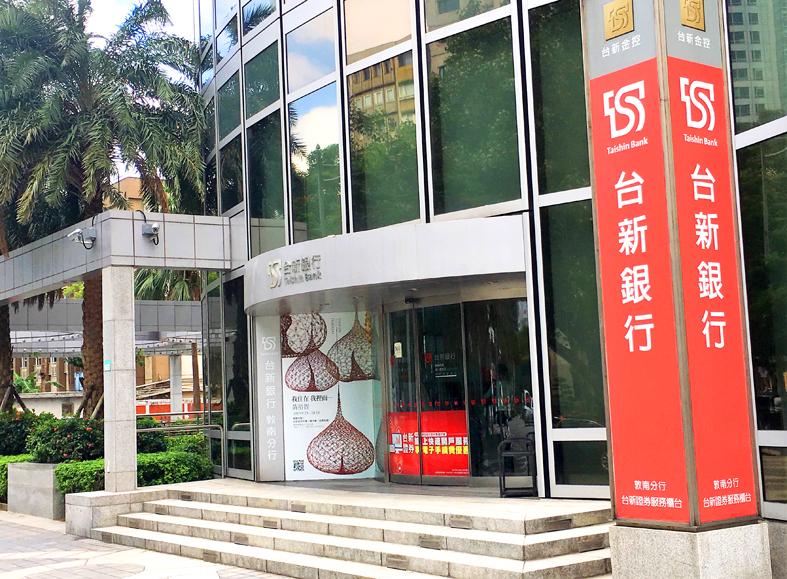The Financial Supervisory Commission (FSC) yesterday fined Taishin International Bank (台新銀行) a record NT$30 million (US$1.07 million) for oversight failure, after its staff stole NT$347 million from customers.
The fine was much higher than the penalty of NT$20 million handed to E.Sun Commercial Bank (玉山銀行) in November last year and the NT$12 million fine to Cathay United Bank (國泰世華銀行) in December last year for similar failures.
An E.Sun employee had stolen NT$140 million from 41 clients, while Cathay United Bank’s staff had stolen NT$17.32 million from four clients, data from the commission showed.

Photo: Wang Meng-lun, Taipei Times
Taishin Bank received the heaviest punishment not only because the NT$347 million its former employee stole from nine clients was the highest among all bank thefts, but also because the employee had done so for more than a decade, from 2008 to last year, indicating the bank’s lax internal controls, the commission said.
The former employee, a customer relationship manager surnamed Chou (周) at a branch in New Taipei City’s Jhonghe District (中和), asked his clients to sign blank transfer forms and then used them to transfer their money to the bank accounts of his friends or his sister, Banking Bureau Deputy Director-General Huang Kuang-hsi (黃光熙) told a videoconference.
Although some of Chou’s clients applied to reconcile their bank accounts, the bank failed to save the records of account activity for inspection, Huang said.
When the bank in 2019 discovered the suspicious cash movement, Chou’s manager only asked him to write a report, but failed to continue monitoring him, Huang added.
The commission also faulted Taishin’s management, saying the bank had cut the branch’s workforce and was overly focused on how much sales its employees could generate, he said.
“Sales had a weighting of 40 percent in an employee’s performance assessment in 2016... Although the weighting was lowered in the following years, it was still comparatively higher than at other banks,” he said.
That might explain why when Chou secretly moved funds from his clients to other accounts, those responsible for checking did not spot the illegal activity, Huang said.
The FSC suspended Taishin Bank’s deputy head of consumer banking, surnamed Lin (林), for three months, saying Lin was responsible for the poor management as he had designed the employee performance assessment, Huang said.

To many, Tatu City on the outskirts of Nairobi looks like a success. The first city entirely built by a private company to be operational in east Africa, with about 25,000 people living and working there, it accounts for about two-thirds of all foreign investment in Kenya. Its low-tax status has attracted more than 100 businesses including Heineken, coffee brand Dormans, and the biggest call-center and cold-chain transport firms in the region. However, to some local politicians, Tatu City has looked more like a target for extortion. A parade of governors have demanded land worth millions of dollars in exchange

An Indonesian animated movie is smashing regional box office records and could be set for wider success as it prepares to open beyond the Southeast Asian archipelago’s silver screens. Jumbo — a film based on the adventures of main character, Don, a large orphaned Indonesian boy facing bullying at school — last month became the highest-grossing Southeast Asian animated film, raking in more than US$8 million. Released at the end of March to coincide with the Eid holidays after the Islamic fasting month of Ramadan, the movie has hit 8 million ticket sales, the third-highest in Indonesian cinema history, Film

Taiwan Semiconductor Manufacturing Co’s (TSMC, 台積電) revenue jumped 48 percent last month, underscoring how electronics firms scrambled to acquire essential components before global tariffs took effect. The main chipmaker for Apple Inc and Nvidia Corp reported monthly sales of NT$349.6 billion (US$11.6 billion). That compares with the average analysts’ estimate for a 38 percent rise in second-quarter revenue. US President Donald Trump’s trade war is prompting economists to retool GDP forecasts worldwide, casting doubt over the outlook for everything from iPhone demand to computing and datacenter construction. However, TSMC — a barometer for global tech spending given its central role in the

Alchip Technologies Ltd (世芯), an application-specific integrated circuit (ASIC) designer specializing in server chips, expects revenue to decline this year due to sagging demand for 5-nanometer artificial intelligence (AI) chips from a North America-based major customer, a company executive said yesterday. That would be the first contraction in revenue for Alchip as it has been enjoying strong revenue growth over the past few years, benefiting from cloud-service providers’ moves to reduce dependence on Nvidia Corp’s expensive AI chips by building their own AI accelerator by outsourcing chip design. The 5-nanometer chip was supposed to be a new growth engine as the lifecycle